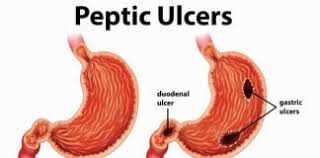Gastroenterologists are setting the record straight:
Contrary to popular belief, skipping meals does NOT directly cause stomach ulcers.
While this myth persists among many Nigerians, medical experts emphasize that prolonged fasting may aggravate ulcer symptoms—but it’s not the root cause of the condition.
Peptic ulcer disease, characterized by painful open sores in the stomach lining or duodenum (the upper part of the small intestine), remains a major public health concern in Nigeria. Complications from ulcers frequently rank among the top causes of emergency hospital admissions for severe abdominal pain.
So what really causes ulcers? The primary culprits are:
Helicobacter pylori (H. pylori) infection – a stubborn bacteria that attacks the stomach lining
Long-term use of NSAIDs (painkillers like ibuprofen and aspirin)
Excessive acid production due to stress, smoking, or other factors
“Skipping meals can increase stomach acid, which may irritate existing ulcers, but it doesn’t create them,” explains a leading gastroenterologist. “The real danger lies in untreated H. pylori infections and overuse of pain medications.”
The takeaway? While regular meals help manage ulcer discomfort, proper diagnosis and treatment—not just eating on schedule—are key to healing and prevention. If you experience persistent burning stomach pain, nausea, or bloating, consult a doctor for testing and targeted care.
Bottom line: Don’t just blame missed meals. Know the real risks, get tested for H. pylori, and use painkillers cautiously to protect your stomach long-term.
Burning Stomach Pain? You Could Be Among the 10 Percent At Risk of Peptic Ulcers – Here’s What Doctors Want You to Know
That persistent gnawing or burning pain in your stomach could be more serious than you think. Medical experts reveal that between 5 to 10 percent of people worldwide will develop peptic ulcers during their lifetime. While this painful condition can affect anyone, middle-aged adults—especially men—are at higher risk.
In an exclusive interview with PUNCH Healthwise, leading gastroenterologists clarified the real causes behind these painful sores in the stomach or small intestine lining. Contrary to widespread belief, skipping meals does not cause ulcers. The true culprits are far more specific:
First, Helicobacter pylori infection, a stubborn bacteria that attacks the stomach lining. Second, the frequent use of common painkillers like ibuprofen and aspirin, known as non-steroidal anti-inflammatory drugs.
“Many patients mistakenly blame stress or irregular eating habits,” explained one specialist. “In reality, untreated H. pylori infections and overuse of pain medications are the primary offenders behind most ulcer cases.”
This information is particularly crucial for Nigerians, where ulcer complications rank among the leading causes of emergency hospital admissions. The problem affects millions who may not realize the actual causes of their discomfort.
The key takeaways are clear:
– Persistent stomach pain warrants testing for H. pylori
– Regular use of painkillers can seriously damage your stomach lining
– While diet helps manage symptoms, only proper medical treatment can cure ulcers
The message from experts is straightforward: understanding the true causes is the first step toward effective treatment and prevention. If you experience ongoing stomach pain, consult a healthcare professional for proper diagnosis rather than relying on assumptions or temporary fixes.
By spreading accurate information about ulcer causes and treatments, we can help reduce unnecessary suffering and complications. Your stomach health is too important to leave to chance or misinformation.
Doctors Debunk Common Ulcer Myths in Nigeria – Here’s What You Need to Know
For generations, Nigerians have blamed stomach ulcers on skipped meals, spicy foods, or stress. But medical experts are now revealing these long-held beliefs are not only incorrect – they’re potentially harmful to public health.
Dr. Ganiyat Oyeleke, a Consultant Gastroenterologist at Lagos University Teaching Hospital, explains the reality: “Not eating doesn’t cause ulcers. The true causes are far more specific and dangerous.”
**The Real Causes of Ulcers**
Research shows two primary culprits behind peptic ulcers:
1. H. pylori Infection
This spiral-shaped bacterium attacks the stomach’s protective lining, making it vulnerable to damage. A 2021 Nigerian study found a shocking 87.7% of duodenal ulcer patients were infected with H. pylori. The bacteria spreads through contaminated food, water, or close personal contact – particularly in areas with poor sanitation.
2. Painkiller Overuse
Many Nigerians unknowingly harm their stomachs by frequently using common pain relievers like Alabukun, Feldene, and Diclofenac. These medications can gradually wear away the stomach’s protective lining.
Why These Myths Matter
These misconceptions aren’t just harmless folk beliefs – they have serious consequences:
– They delay proper diagnosis and treatment as people blame the wrong causes
– They lead to dangerous self-medication practices that can worsen ulcers
– They allow H. pylori infections to spread undetected in communities
What You Should Do
If you experience persistent stomach pain:
– Get tested for H. pylori infection
– Use pain medications only as directed by a doctor
– Practice good hygiene to prevent bacterial spread
Dr. Oyeleke emphasizes: “We need to move past these outdated ideas about ulcers. Understanding the true causes is the first step to proper treatment and prevention.”
The message is clear: ulcers aren’t caused by lifestyle choices like diet or stress patterns. They’re medical conditions requiring proper diagnosis and treatment. By spreading accurate information, we can help reduce unnecessary suffering across Nigeria.
If you or someone you know suffers from recurring stomach pain, encourage them to consult a healthcare professional rather than relying on common misconceptions. Proper medical care can make all the difference in treating and preventing ulcers.
Doctors are setting the record straight about stomach ulcers, revealing that many common beliefs are simply myths. “Spicy foods and stress don’t actually cause ulcers,” explains Dr. Ganiyat Oyeleke, a gastroenterologist at Lagos University Teaching Hospital. “While they can make symptoms worse, the real causes are H pylori bacterial infections and overusing pain medications.”
Dr. Oyeleke highlights several widespread misconceptions she regularly encounters in her practice. Many patients mistakenly believe milk can cure ulcers, that all stomach pain indicates an ulcer, or that a simple blood test can diagnose the condition. “Proper ulcer diagnosis requires endoscopy,” she clarifies. “And abdominal pain could come from various organs like the gallbladder or pancreas, not just ulcers.”
The specialist strongly advises against self-treatment. “People should stop relying on antacids or home remedies and get proper medical evaluation instead,” she says. “H pylori infections are completely treatable with the right antibiotic therapy, but only if correctly diagnosed.”
While diet doesn’t cause ulcers, Dr. Oyeleke emphasizes its importance in managing symptoms and promoting healing. She recommends eating high-fiber foods and probiotics, having smaller but more frequent meals, and avoiding alcohol, caffeine, and fatty or acidic foods.
Her final message is clear: “There’s no such thing as ‘just an ulcer.’ Persistent stomach pain requires professional medical attention, not self-medication. Getting the right diagnosis and treatment can prevent serious complications.”
Doctors are raising urgent concerns about the dangerous misconceptions surrounding stomach ulcers in Nigeria. Gastroenterologists Dr. Muyiwa Bojuwoye and Dr. Ganiyat Oyeleke reveal startling truths that could change how Nigerians manage stomach pain.
“The painkillers many people take without thinking could be slowly eating away at their stomach lining,” warns Dr. Bojuwoye. Their research shows most ulcer cases stem from two preventable causes that continue to be ignored.
The real culprits behind ulcers are not what you think:
– H. pylori bacteria, responsible for nearly 90% of duodenal ulcers
– Indiscriminate use of common painkillers like Alabukun and Diclofenac
Dispelling dangerous myths, the doctors explain:
Myth: Spicy foods cause ulcers
Truth: They only irritate existing ulcers
Myth: Stress creates ulcers
Truth: It worsens symptoms but doesn’t cause the damage
Myth: Fasting leads to ulcers
Truth: It may increase discomfort but doesn’t create the condition
The doctors emphasize this crisis is worsening because:
– People mask symptoms with the very medications causing harm
– Many wait until complications develop before seeking help
– H. pylori infections spread undetected through families
Their prescription for change:
First, get tested for H. pylori if you have recurring stomach pain
Second, never self-prescribe NSAIDs for abdominal discomfort
Third, recognize classic ulcer symptoms like burning pain that temporarily improves with eating
Dr. Bojuwoye stresses, “We’re not just treating ulcers – we’re battling generations of misinformation. That persistent stomach pain deserves proper medical attention, not guesswork.”
The message is clear: Continuing to blame the wrong causes and self-medicating could lead to serious complications. The solution starts with proper testing and professional treatment, not assumptions or home remedies. If you experience regular stomach pain, consult a doctor before reaching for another painkiller. Your health is worth more than temporary relief.
Doctors have clarified the true causes of peptic ulcers, dispelling common myths that continue to mislead many Nigerians. According to medical experts, the primary causes are:
1. Helicobacter pylori (H. pylori) bacterial infection
2. Excessive use of non-steroidal anti-inflammatory drugs (NSAIDs) like ibuprofen, aspirin, and diclofenac
Peptic ulcers are open sores that develop in the stomach lining or upper small intestine. While many believe stress, spicy foods or fasting cause ulcers, doctors emphasize these factors only aggravate existing ulcers rather than causing them.
Key facts about ulcer causes:
– H. pylori bacteria is responsible for most ulcer cases
– Regular NSAID use damages the stomach’s protective lining
– Smoking and alcohol worsen ulcer symptoms but don’t cause ulcers
Common misconceptions corrected:
Spicy food may irritate ulcers but doesn’t cause them
Fasting doesn’t lead to ulcers but may increase discomfort
Stress doesn’t create ulcers but can worsen symptoms
Medical advice:
– Seek proper testing for H. pylori if experiencing persistent stomach pain
– Use pain medications cautiously and under medical supervision
– Avoid self-diagnosis and treatment of ulcer symptoms
Doctors stress that proper diagnosis through medical examination is crucial, as untreated ulcers can lead to serious complications. The solution lies in addressing the actual causes through appropriate medical treatment rather than relying on popular but incorrect beliefs.
Medical experts are raising serious concerns about common but dangerous practices that increase ulcer risks. A leading specialist cautions against self-medication, particularly the harmful habit of mixing different painkillers or combining them with steroid medications. These practices dramatically raise the likelihood of developing painful stomach ulcers.
The doctor highlights crucial facts about H. pylori, the bacteria responsible for most ulcers:
– This widespread infection affects about half of people worldwide
– It damages the stomach’s natural protective barrier
– The bacteria spreads through contaminated food or water, poor hand hygiene, and sharing eating utensils
For prevention, doctors recommend:
Regular and thorough handwashing
Avoiding known stomach irritants like spicy foods, coffee, and alcohol
Quitting smoking completely
Seeking professional medical advice for any persistent stomach pain
Accurate diagnosis requires proper medical testing:
Specialized H. pylori detection tests
Barium swallow imaging studies
Upper endoscopy procedures
The specialist emphasizes that self-diagnosis is risky, as stomach pain could signal various conditions from ulcers to more serious illnesses. They strongly advise anyone with ongoing abdominal discomfort to consult a qualified gastroenterologist for proper evaluation and treatment. Early professional intervention can prevent complications and ensure appropriate care.
Medical experts are raising concerns about widespread misconceptions regarding peptic ulcers in Nigeria. A recent study conducted among students at Kwara State Polytechnic revealed alarming gaps in public understanding of this common condition.
The research found that while 78 percent of surveyed students were aware of peptic ulcer disease, knowledge about its actual causes remained dangerously inaccurate. Shockingly, only 0.3 percent of respondents correctly identified Helicobacter pylori (H. pylori) infection as the primary cause, despite medical evidence showing this bacteria is responsible for over 90 percent of cases.
Instead, most students held incorrect beliefs:
81 percent blamed prolonged fasting
54 percent attributed ulcers to spicy foods
18 percent even cited spiritual factors
Doctors emphasize these findings highlight a critical public health education gap. They stress several important facts the public needs to understand:
Milk does not cure ulcers
Antacids only provide temporary symptom relief
Ulcers can affect people of all ages, including children and young adults
The study authors, led by Dr. Bojuwoye from the University of Ilorin, warn that these misconceptions are particularly concerning given Nigeria’s rising cases of ulcer complications. They attribute this trend to delayed proper treatment as people rely on incorrect home remedies or temporary solutions rather than seeking medical diagnosis.
Medical professionals urge nationwide education campaigns to correct these dangerous myths. They emphasize that accurate knowledge about H. pylori transmission and the risks of prolonged NSAID use could significantly reduce ulcer cases and prevent serious complications. Proper diagnosis through medical testing and appropriate antibiotic treatment for H. pylori infections remain crucial for effective ulcer management.
The study revealed troubling gaps in students’ understanding of peptic ulcer disease. Only 17 percent recognized medication as proper treatment, while 64 percent mistakenly believed regular eating could cure ulcers. Science students demonstrated twice the awareness of non-science peers, highlighting educational disparities.
Researchers emphasize an urgent need for targeted health education among Nigerian youth. They recommend incorporating accurate medical information into school curricula nationwide, warning that persistent myths about common conditions like ulcers may lead to preventable health complications and deaths. The findings underscore the importance of multisectoral collaboration to improve health literacy.




No comment